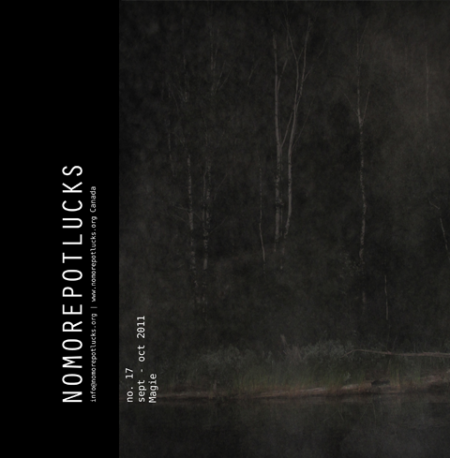Will the 41st Canadian Election see the return of the youth vote? The previous election in 2008 saw the lowest voter turnout in the nation’s history, especially among youth.
So far the “youth” I’ve heard interviewed by the CBC—university students all—appear somewhat clueless. Is the uneducated, unengaged, uncaring countenance portrayed by national media an accurate sign of general malaise amongst the under-25 crowd? Or does it merely show that reporters still don’t know who to talk to on campus, avoiding the radicals hanging around the campus and community radio station, passing by the scribes at the student newspaper, ignoring the offices of student politicians, all in the vain hope for some kind of “average student” as somehow synonymous with the general (which is to say, non-voting) populace?
Such strategies only serve to reinforce the narrow perspectives of ageism. Yet something nags at the contemporary image of Canadian youth—a striking absence from the landscape, as if youth had once and for all become the niche-market consumers they were programmed to be since birth. A lack of rebellion pervades a youth generation that appears completely infatuated by the technics of consumerism and always-on communication. A pastiche of postmodern style has stagnated into over a decade of hipsterism that drags on & on without reinvention nor cultural innovation. Music regurgitates itself without push nor force. Meanwhile, this cultural merry-go-round—a kind of cyclism of rehashed styles—rotates around an absent pillar: that of youth displeasure and rebellion against the controlling interests of the nation-state. In the ’90s Naomi Klein and Adbusters writ about rebellion as bought & sold as an advertising strategy. Today we talk about the absence of even such strategies. It is as if an election and the workings of democracy are a disposable communicative fragment that, moreover, is denigrated as one particle stream amongst all others. The election, like a text message from a nagging parent, is easily deleted, without even the dignity of a NO LIKE button.
Cryptofascism & the Uncitizenry
Indeed, it is tempting to argue that no rebellion can exist in such a fragmented existence wherein the nation-state and its democratic apparatus are reduced to hollow signs that have no virtual presence on social networks. There is no rebellion not because youth don’t care; there is no rebellion because youth live in a world created and catered through info-filtering mechanisms tailored so precisely to predict and provide for their consumer and erotic impulses that the practice of democratic choice has no place within it. One can LIKE but one cannot not like; there is no choice per se, only the metrics of one-way desire. Two questions:
(1) Are youth inculcated in a new form of choice that negates choice—which is to say a nonchoice—in which decision-making can only form either a favourable mark (LIKE) but not its expressed DISLIKE? Moreover, is this merely a “youth” phenomenon? Is this not simply the one-way directive of desire that has become pronounced in social networks?
(2) There is no VOTE app on Facebook nor for the iPhone. Mediated existence, though it registers the metrics of LIKE that appear seemingly everywhere, does not contain a voting sphere. There is no choice in this patterning towards a one-way metrics of desire. Everything appears just for you, me, them: this is how Facebook works with its pyramidal-style News Filter, where that which is LIKED is repeated, reiterated, regurgitated. The new falls by the wayside, the repetition of the same LIKE becomes the horizon of mediated existence of LIKE-LIKE discourse. One never encounters the Other…. is voting now foreign to the discourse engendered by social networks?
This perceptive difference of what the world is—not only its being but its discourse of desire in relation to it, its ontology of technics and urgency—and how it appears for me—its perceptive alignment with implanted consumer desire, what might be called the cryptofascism of corporate perception—suggests a near impasse in engaging any 21st century technological citizen with the centuries-old processes of democratic involvement that require movement, thought and a mark. There is no rebellion because the world itself appears appetizing, as if all communication is geared solely toward un/conscious appetites and ego. It is tailored and remade to appear as-such. All the time. And it is. Desire is an App. An App is an expression of controlling desire. I LIKE the App. I LIKE what is desired (for me).
As the voice of pop radio, Auto-Tune is there for the confusing identity siege that is junior high. Faheem Rasheed is T-Pain. T-Pain is Auto-Tune. Auto-Tune is a vocoder. (T-Pain said so.) I am T-Pain is an App. You are T-Pain. T-Pain is a brand. No sooner did Jay-Z call for Auto-Tune’s head after seeing Wendy’s use it to sell a Frosty, than Apple made the I Am T-Pain app available for $2.99. As demonstrated on the Champion DJ track, “Baako,” babies can now be Auto-Tuned before reaching intelligibility (Dave Tompkins, How To Wreck A Nice Beach: The Vocoder from World War II to Hip-Hop @ 302).
Do I, LIKE? This App? Instead of being ignored, youth—a category no longer of age but of consumer uncitizenry, which is to say, humans who only participate in collective processes through consumption and discourse with corporatized social networks—feel that with social networks and mobile communications that they, each and every one, are the centre of all attention. Uncitizens command and demand—not from their nation-states, but from their corporations, and what they demand is the short-term satisfaction of their pleasures. Nothing is easier to deliver. And when it goes wrong, there is no recourse. One cannot UNLIKE anything. As for voting? This unlikely process might be dismantled in time too.
The State Without Desire
The tactics of consumption, the ingenious ways in which the weak make use of the strong, thus lend a political dimension to everyday practices (Michel de Certeau, The Practice of Everyday Life @ xvii)
At the limit, what do today’s uncitizens expect from the nation-state? Nothing; it does not exist as-such—which is to say as a metric of consumer desire—for them. The nation-state passes into the realm of the hyponoumenal or unsensible. Thus its dismantling appears favourable; why keep what is not an object of desire?
Competing interests to democratic governance play this absence of desire with astute aim: utilising communications media, the absence of desire toward the participatory democracy (neither LIKE nor anything otherwise) is re-presented—advertised, talked up, played out; tweeted, linked, screamed—as an object of DISLIKE. If one’s existence is constellated within online social networks, being presented with democracy as an object of DISLIKE offers the first significant chance to render choice as-such through the expression of concrete negativity. Yet desire here is rendered by proxy: I express DISLIKE, and a “real choice,” only to dismantle its mechanism as-such. The first expression of democratic engagement is self-defeating. DISLIKE is voted through as the dismantling of the system that perpetuates and organises the benefits to be derived from voting.
This is how normative politics emphasizes—and for lack of a better word, pronounces hysterical—the glut of bureaucracy, engaging in a shrill and strident discourse that reiterates tirelessly that hand-outs must stop, that everything from arts grants to education and health care must be reduced or eliminated outright in order to allow the play of the “free market.”
Such normative political interests—which are, at their worst, organised expressions against democratic governance—build not upon an engaged citizenry seeking libertarian governance and a minimalist State, but merely run with the absence of any such desire concerning the State. Such an absence of desire one way or the other allows corporate systems of production to occupy the role once previously held by the State, yet without any such safeguards nor protections offered under democratic governance. Several factors come into play here. Consumerism perpetuates the myth that the “market” provides for all desires (which is to say, it fails to provide what remains necessary , and certainly it does not ensure the equitable benefits of the common wealth). Meanwhile, the technics of perception in which uncitizens engage with the social network aligns desire with socially networked consumerism. Desire is directed toward a ceaseless flow of objects and data (either LIKED or absented in response). The nation-state and its apparatuses do not exist in this realm; they are negated a priori. Is it any surprise that their political expression is thus one of outright negation of the infrastructure of democratic engagement?
We are dealing with borderline technological determinism and worst-case scenarios evidently of the speculative sort. Yet the traces are evident.
A party wishing to capitalize upon this corporatized technics of perception only has to shape a negative platform which satisfies this urge to ignore (if not eliminate) democratic governance completely. At the same time, this grants free reign to the controlling interests of a cryptofascist party (corporate funded) that would capitalize upon the new blindness of an uncitizenry that quite literally has its head down, eyes locked to the mobile screen, while everywhere (and yet oddly, for this perspective, nowhere), the beneficial conditions of collective existence are dismantled (elimination, defunding, privatization).
One must consider the darkest of strategies—that the cryptofascist core is centralizing its power and mobilizing control over resources to ensure its survival as the planet’s environment becomes increasingly unsustainable. This is social Darwinism. These controlling interests have done so by utilising the nonengagement of stagnant democracy to perpetuate the latter’s destruction, thereby catapulting the narrow-sphere of the self-interested to power.
If one were to look for the new collectivism, it only appears in two places:
(1) In that of cryptofascism. The “unite the right” slogan is indeed a crafty strategy to ensure an insider-outsider urge to join those who are successful in attaining power through whatever means possible. The majority of such hangers-on are seekign entry into the corridors of power, and do not realise that they will forever be denied (witness Harper’s controlled campaign appearances). In short, centre-right Liberals voted Conservative so as to “get in on a good thing.” Time to cash in & forget the others. Yet this is only one part of the strategy; the second part is amassing votes from those who believe in positions that are, in fact, executed in their obverse. That neoConservatives spend more than their “socialist” competitors—usually on militarization and imprisonment—is a fact oft ignored by those voting neoConservative so as to support fiscal conservatism. Likewise, “lower” taxes are designated for corporations, not the lower-middle class (and “ethnic”) voters who swing Conservative. A basic failure to grasp actual factual conditions prevails; at its worst, this is the rise of the New Dumb.
(2) As for the second collectivism, it forms as counterposition to the Right. In Canada this polarization has collectivized around the NDP, which has formed the Official Opposition in Parliament. In itself, the rise of a declared Leftist party signals hope—for those seeking democratic engagement—and yet, also concern over an American-style polarization of the spectrum in which both sides descend into a politics of the very worst. The centre has fallen out, and its contents spilled out in two directions. Most of its contents spilled Left; the NDP gained 65 seats while the Conservatives gained 24. Yet can the collectivist action behind the NDP sustain itself in Canada’s volatile political landscape? In a situation where still-separatist Quebec holds the trump card with its NDP “orange crush”? In a mediasphere where the probable axing of the CBC will result in further attack ads and tarnishing of the NDP as the Conservatives strive for absolute power by ushering in Harper’s Media Centre?
We are here again speaking of the engaged and those who voted—only about 61.4% of the eligible voters. Unless mobilization occurs in the voting sphere, it will be a shock indeed when the uncitizen pokes his or her head up and realises there is nothing left for them. That all which is for me is now merely a waste of words. That the world itself has been sold off….
Millenial Malaise and the Resurgence of Generations X & Y
One cannot rebel against that which is nonsignifying, which is to say, against that which is not only imperceptible, but quite simply off the radar of desire. The Green Party experienced this precisely this election. Off-the-radar, out-of-the-debate. Unrepresented. A non-object. The nation-state is not an App. It has no status update. The psychosocial dimension of this malaise is the persistence of boredom in an always-on environment. Or rather, teenage-era forms of rebellion have solidified as technico-ontological frameworks of perception amongst young “adults”: pronounced boredom through ceaseless consumption—until debt do us a part; general malaise of the uncitizen as precarious part-time work provides a deadening of stimulation; distracted nonattention as competing virtual environments promise the collectivity which is everywhere destroyed in the concrete; and a lack of engagement becoming a performative lifeworld of “not caring cool.”
Too bad that’s the formula for getting fucked over by the big bulge of the population. The boomers, who increasingly vote for their own aging interests, privatize health care and dismantle social services, all in an effort to keep their own taxes low, and all at the expense of future generations, a.k.a. today’s youth vote.
Do Millenials even realise how badly they’re getting screwed by their own parents and grandparents? Apparently not; it’s not a tweet meme, hashtag, nor status update. VICE magazine covered it years ago, but that’s Gen-X & Y critique circa 2005. The Millenials missed it.
Conventional wisdom says that engaged youth primarily vote on social issues, with a strong tendency to vote NDP. Keeping down the youth vote has been a strategy of the neoConservatives since day one—as witnessed with the brownshirt tactic of disrupting advance polling (as was the case at the University of Guelph).
Yet survey data shows that the NDP surge in Quebec has little to do with the youth vote. If correct, this data tosses the conventional wisdom that once you “grow up and start paying taxes,” you vote only for your narrow self-interest, and thus brainlessly throw your vote in with any party that promises a lowering of taxes. It also demonstrates the increasing power—and here I hedge a thetic guess—of Generation X & Y.
The return of the rave generation & post-punk politics
Generation X, whether bitter ex-punks or Douglas Coupland’s cocaine-fuelled cubicle kids, have long been ignored under the heel of the boomers. Gen Y, the rave generation, has seen its entire musico-cultural expression criminalized and erased from the history books. Both generations were the last vestiges of inspired rebellion from the ’60s; these are the generations of the APEC and Quebec City protests, of Clayoquot Sound, of mass rave culture and its collectivist pursuits. It was Generation Ecstasy that brought the dark rebellion of rave culture into the light, organising Reclaim The Streets, the rise of “carnivals against capitalism,” providing the organisational capacity and infrastructure for the alterglobalization movement that brought down Seattle and Genoa. Gen X & Y are the generations of hackers, hacktivists, DiY-zine producers and internet utopians, Burning Man freaks, DJs and musicians, artists who fled to Montréal (and Berlin), the generation of mass energy throughout the ’80s and ’90s that, in a word, connected Lollapalooza to Woodstock, alterglobalization anticapitalist carnival to May ’68, rave culture to the Happening & Be-In.
Is this generation beginning to find itself? Its rave-era participants possess an uncanny organisational capacity—could it be directed toward reinvigorating the institutional Left? Overtaking it entirely? Are these generations beginning to vote en masse? Will new forms of party politics arise from these much more complex political landscapes of late-night bohemians that nonetheless have tasted the freedom of the TAZ?
Evidently there are splits within the boomer demographic as well. The incumbent party that supposedly stands for fiscal conservatism—Canada’s delightful neoConservatives—has pursued a massive increase in military expenditure, including 30 billion dollars over 30 years on fighter jets (and without cost-saving measures of competitive contracts). The Conservatives have racked up the largest deficit in Canadian history, some 55.6 billion. Harper’s promise of fiscal conservatism is, moreover, encoded within a right-wing moral conservatism based upon fundamentalist Christian beliefs, including Stephen Harper’s involvement as a founding member of the pro-apartheid, pro-South Africa, pro-white Northern Foundation in the late 1980s (see more research on these connections here). The signs are everywhere of increasing neoConservative strategies: Conservative defunding of Planned Parenthood, and other indications of religious fundamentalists being placed in positions of power over, say, the portfolio of science and technology.
Like, the Youth?
As for the youth? A good point is made here, that winning the youth vote begins with respect. According to blogger AW Reeves, political parties need to
talk about urban issues and green infrastructure; building better public transportation and supporting the arts; the importance of local and healthy food; of civic engagement, political participation, and the importance of taking pride in where you live (AW Reeves).
In short, the issues of youth are, perhaps, more progressive and varied than those of mere education. I agree. I would’ve said the same in the mid-1990s when Generation Y came into the age of majority, but hey, we were too busy organising on cultural and political levels an entire collectivist movement of alterglobalization and electroniculture. And still, many voted. Or loudly protested its lack of options. However, it is worth noting that education is always defunded in proportion to the neoConservative increase in prisons. Education is a broader issue than just youth; it has to do with creating and sustaining an enlightened citizenry. Without it, we usher in the Tea Party mentality of the New Dumb. Is this not a neoConservative strategy?
That Reeve’s optimism is tempered by his observation that seniors are a better bet strategically for enterprising political parties—”seniors have a stronger sense of the importance of voting, and more time on their hands typically”—only suggests yet more reasons to ignore the youth vote. Youth are the future of democracy, and always will be. In the ’60s the boomers understood their strength in numbers, which was repressed, it would seem, only through sheer violence (Kent State, COINTELPRO, assassination and imprisonment of activists) and over-indulgence (the excesses of the ’60s drug culture). While the Millenials do not exist as strength in sheer numbers, they can tip the scales if they vote.
But is it feasible to expect an engagement with the papertrails and processes of democracy by a generation only connected through its disconnection, otherwise untouched by the concrete? The infiltration of existence by technical means of capture, screens & devices that effectively “capture consciousness,” has meant that an entirely new sphere of bubble-world existence is the new technico-ontological state of Millenial desire. And the highly powerful yet seemingly invisible nation-state does not appear within this social radar of the captured consumer kids—at least not until the VOTE APP.
The Black Box of Control
Indeed, why not a VOTE APP? The answer remains resoundingly negative for all the reasons the white hat hackers of 2600 have exposed concerning the control mechanisms contained within electronic voting machines (which probably delivered Florida on a few occasions for Bush) as well as the lack of security, transparency and accountability once information is rendered digital.
This suggests that, quite profoundly, democracy is a fleshy and breast-to-breast encounter, if even with the ballot slip. Its effort of engagement underscores its significance to the collective capacity of discourse and organisation that sustains the nation-state. Like, dude, one cannot VOTE by hitting the LIKE button.
../…. .

















 RT
RT 